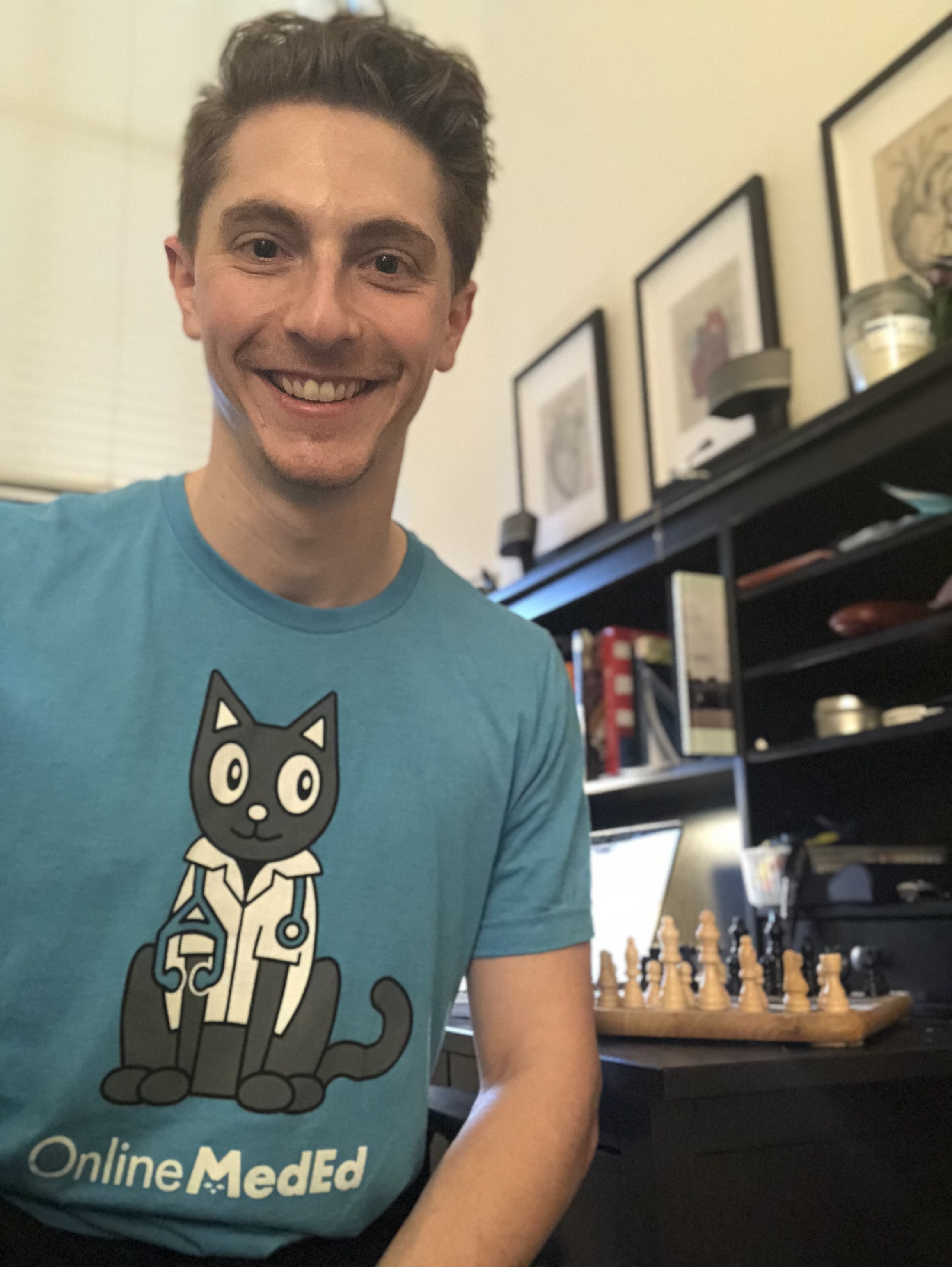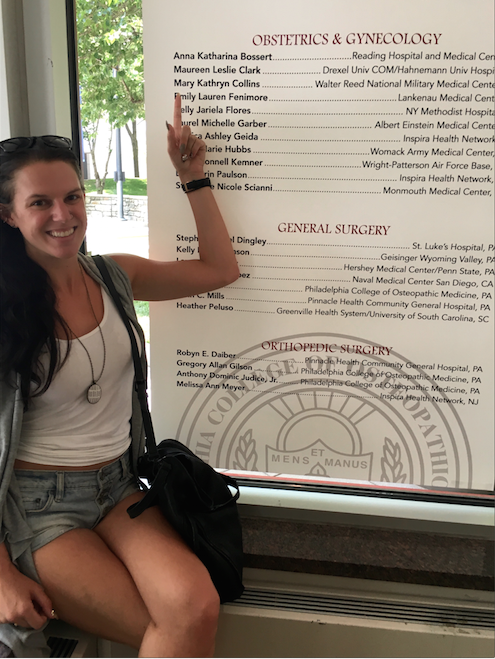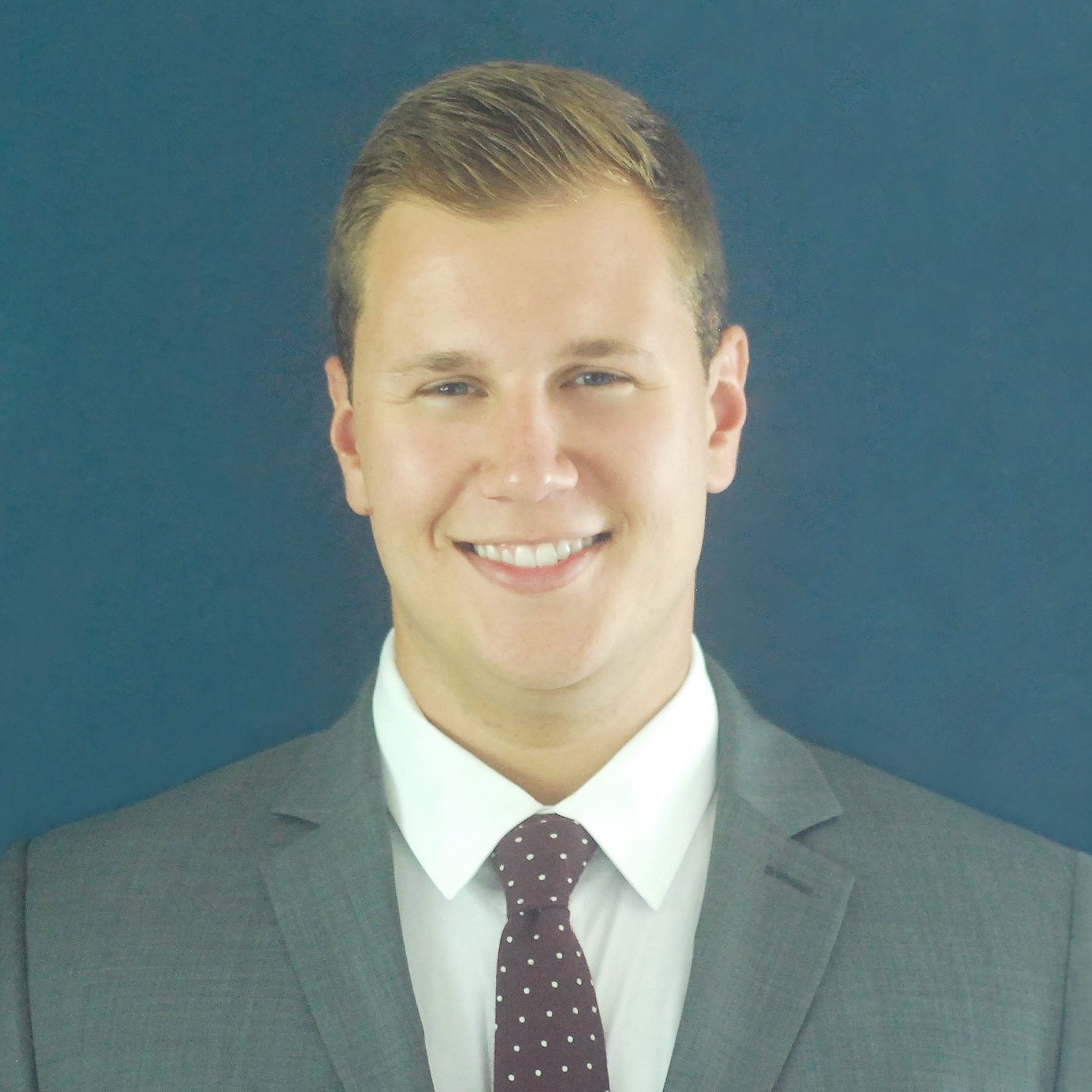I sat down with Zack Manier, a Ross University School of Medicine graduate from St. Louis, who will be starting the first of his three year pediatrics residency at The Children’s Hospital at St. Peter’s University Hospital in New Brunswick, NJ. He is the first interview in a series of blog posts that will shine a light on the match process.
Tell us a little bit about yourself. Who are you professionally? Who are you outside of the hospital?
Let’s see…I grew up in a typical Midwest suburb outside of St. Louis, MO. I was one of those 4.5 GPA kids who could study the morning of with little effort and get an A and was in every AP class you could think of. I was a big band and orchestra nerd (hey, it was the cool thing at my school! We had football players in marching band, okay?) but a beach bum at heart. I love the sun and the sand, and can’t get enough of the ocean. I got out of the Midwest and moved to the Sunshine State for undergraduate, completing my BS in psychology at the University of Central Florida in Orlando.
Professionally, I feel like I’m empathic and relatable with my patients, and definitely a good listener. I consider myself more common-sense and witty knowledgeable than book smart, and am most definitely not a gunner. I am not afraid to speak out when I know something and will not back down if I know I am correct, but I am a team player and refuse to make others look bad for personal gain, as so many do (you will come to unfortunately find out).
How did you end up at Ross University?
That last-minute study mentality caught up to me in my science classes in college, causing me to not be accepted to medical school the first time I applied (study hard, kids!). I had not considered nor heard about Caribbean schools and was looking into go down unda’ to Australia for school, when I discovered the “big three” Caribbean schools. Because they accepted year-round applications, and I did not want to delay starting medical school another year, I decided to apply. I applied in April, interviewed in May, and was accepted to all three in June for the August class. I went with my gut and chose Ross University, and I couldn’t be happier with my decision. My eternal wanderlust and love of the tropics had me going to the right place.
What residency specialties did you apply to? How did you come to choose them?
Pediatrics and OB/GYN and I ended up matching into pediatrics. It was always pediatrics from the start, and my core rotation confirmed that. I was actually dreading OB/GYN (as most medical students do). It was my last core rotation; my attending told me, “You’re not going to be a pediatrician. I’m going to make you an OB/GYN by the end of this.” I highly doubted her, but she was right. She was amazing, and working side-by-side with her opened my eyes to the world of OB/GYN. I think it completely depends on your core experience…I had a friend who had a HORRIBLE OB/GYN core, so she hated it. I probably would have never come to love OB/GYN if I was in her situation. I can fully say that Dr. McDonald at AMC single-handedly kindled my love for OB/GYN.
So I ended up applying to both because I had a genuine interest in both. I would have been happy with either. Neither was a backup.
How many programs did you end up applying to? What was your reasoning for that number of programs?
I applied to 75 pediatrics programs and 50 OB/GYN programs, so 125 total. Some may say that’s a small number, especially within the individual specialties…they’re probably right. I felt I was less competitive for OB/GYN, hence the lower number of programs. Basically, I went to every program’s site and added it to my list as long as I met their requirements listed. I then removed any programs I knew I definitely did NOT want to go to, whether based on location or other things I found on their sites. That landed me at roughly 125. I’m also super anal/obsessive-compulsive, so applying to 126 or 124 would have driven me nuts (aka not a rounded number). I know, maybe that’s not the time to act that way, but I can’t help it. So I may have tacked on or removed one here or there. In the end, I was comfortable with that amount of programs and amount of money I was spending. I never once felt I over- or under-applied.
How many interviews did you receive in each field?
I received six pediatrics interviews and four OB/GYN interviews. Whoa! That’s not very many! No, it’s not (see below). But hey, they say if you have 10 interviews, you’ll basically match. Checkmark. Plus, I know people who matched with way less than me and people who didn’t match with more than me. Don’t let it get you down.
Of note—I only ended up going to 9/10 interviews. The more I looked into one of them, the more I felt it wasn’t for me. Yeah, canceling an interview when I had so few may be crazy, but hey…why spend extra money and time on a program you have no interest in? How do you know you don’t like a program? I can’t tell you that…you just do. It’s just a feeling you get. I was confident enough with how my interviews had been going that I didn’t think I needed that one.
How did you end up ranking the programs? (looking at the perspective of why you ranked a pediatric program higher or lower than an OB/GYN program)
I sincerely ranked my programs based on the programs themselves (and partly based on location). I was not going in ranking one specialty higher or lower. As soon as I returned from an interview, I inserted it into a list appropriately based on comparison with previous interviews. You just get a “feeling” when you’re there.
One program was already lacking in pre-interview communication, so I already had a bad taste, and ten minutes into the interview, I knew it was not for me. It was so bad that I considered not ranking it at all. I ended up ranking it just because I really felt I would not end up there (and I didn’t), but I ranked it very last, and even that was a struggle.
My top choice happened to be OB/GYN (so I obviously didn’t match my top choice), but that was solely because it was a new program that I felt was amazing, and it was in the south (no snow, hell yeah!). It was Atlanta, to be exact, where I had done my cores and a city I fell in love with.
One program was pretty amazing, but the location was so rural that I didn’t think I would even enjoy any free time I did get. It just didn’t meet my lifestyle needs. Even the residents said that they flew somewhere every chance they got, even if it was just a weekend. I ranked it lower on my list because of that.
If you must know, they ended up ob—ob—peds—peds—peds—ob—peds—peds—ob. Completely mixed, like I said. That’s based on things like program directors, attendings, residents, schedules, various opportunities, and the overall feeling I had at each program.
At the end of the day, I said I would be happy if I matched within my top five, which I did. I am excited about the future, and feel like I ended up exactly where I was meant to be. (But we can follow up on this in a year lol)
What was the most challenging aspect of applying to two different fields?
Definitely writing two personal statements! This is so critical…you can’t really even tweak one to fit the other specialty. Okay, maybe you could for internal medicine and family medicine, but definitely not my two specialties. It was a lot of extra time.
Keeping track of what type of program I was at was also key. There are two ways you can go about it…the honest, “I’m applying to [insert specialty] also,” or the not-so-honest “I love [insert specialty] and am only applying to it.” I went with the latter. I was confident enough that my interviews were not going to overlap or affect each other, so why put any doubts in a program’s mind? As far as I’m concerned, treat each program you interview at like it’s your top choice and you are so excited to be there, and give everyone you meet that same impression.
Originally, there was also the concern of “What if I get interviews for both specialties at the same hospital?” I decided I would deal with that if/when the time came, but, fortunately for me, that never happened. I can’t give any advice on what to do there except to go with your gut and be prepared to deal with the consequences, whether good or bad…you don’t want to get caught in a lie.
Any crazy stories from the interview trail?
So, one OB/GYN program (that awesome but rural one), we were each supposed to have three 30 minute interviews. Someone cancelled last minute, so a few of us got an extra interview. Lucky me, I ended up with four 30 minute interviews. TWO HOURS OF INTERVIEWS?! I thought that was crazy. To top it all off, one of them had me suture during the interview, and another had me do laparoscopy WHILE asking me interview questions. Good thing I can multi-task! Side note, we were also given an article about REI ahead of time and told to read/be prepared to discuss it…only the program director was asking about it, and I didn’t have an interview with him. So I basically read it just for fun.
I was also told in advance that one pediatrics program I was interviewing at basically just pimped the entire time and that several people came out crying. Although I did hear that some people were asked medical questions depending on the interviewer while I was there, I was not. So, do not believe everything you hear or get worked up/nervous in advance over something. Just be confident with yourself. I did have two interviewers there though…one lasted 45 minutes, and she just grilled me on if I think Caribbean schools are akin to US schools, and whether or not our USMLE step scores reflect that. Okay? Whatever. My second interview was the assistant program director and basically told me my file looked good and she would be happy to have me, and I was done in five minutes, no questions asked.
The program I said I almost didn’t rank? Basically, everything was bad. Too much to type. But let’s just say that it was an OB/GYN program, and the resident who was giving us the tour had wanted pediatrics, but ended up in OB/GYN (don’t ask me how that happened). On our tour, we passed the pediatrics group, and he said, “Hey peds, have fun! It’s a great program…unlike the OB/GYN program.” Um…ok. That sealed the deal. If your own residents are bad-mouthing your program to prospective residents…not a good sign.
Finally, you will run into “talkers”—people who talk themselves up way more than they should just to feel good about themselves and make you feel worse. Ignore them. You can tell who they are. I had heard about one girl who I had not yet had the pleasure of meeting yet on the trail, until I finally ended up at an interview with her. I knew right away it was her. She poopooed on anyone who went to a foreign school and acted like she came from the Ivy League, even though she was simply at an average run of the mill Midwest med school. She was also reapplying, as she didn’t match her first time applying to OB/GYN. She was gloating about how she now had over 60 interviews but couldn’t find the time. “I had a program call me last week and say they really want me but just don’t have an interview slot.” Bullshit. That’s how you know. You don’t go from not matching to 60+ interviews in your year off. You’re not Mother Teresa. Ignore those people, please.
What were your greatest weaknesses about your application?
My biggest weaknesses, I felt, were my step scores, without a doubt. I was actually surprised at how many interviewers told me my scores were just fine, but who knows if they were just saying that. I didn’t really get grilled about them at all. I found most people want to get to know you for you…they’re already past what is on paper. So focus on that in your interviews. I did feel, however, that my scores limited me in the application phase, as I didn’t meet score requirements for some programs here and there. That’s when scores really matter…they will get you more interviews.
In contrast, what do you think were your greatest strengths about your application?
My biggest strengths? Everything else. I had all A’s in my cores and electives (which led to a strong MSPE), and I had STRONG letters of recommendation. Almost every (if not all) program complimented me on my letters. Those rec letters are so important…scores/grades are just numbers on a page, but letters tell the program who you are and how you work. I also feel that I’m a strong writer, and I was pretty pleased with my personal statements. I was only asked about them occasionally. Finally, thankfully I had a pass on CS and I improved from Step 1 to Step 2, which are both critical, especially with weaker scores.
You’ve already given a lot of great advice but many of my readers will still ask, how did you do on the USMLE’s? What were your step scores? Do you think your step scores negatively/positively affected the number of interviews your received?
I kind of touched on this above, but as for the scores: 217 on Step 1, 222 on Step 2, and first-time pass on CS. Why? I don’t think I put as much effort into studying for them as I should have. Based on my school’s exams/shelf exams/GPA, most would’ve thought I would’ve done much better. I expected higher scores and was disappointed with them, but there’s nothing you can do at that point except make sure the rest of your application is strong, which I did. I do think it affected the number of interviews I received…I obviously would have received more with higher scores. Many programs filter initially solely on Step 1 scores…even though you may meet their online requirements, they eventually have to filter out people once they receive so many applications. My saving grace was CS and the score improvement between steps, no matter how small the jump. Just don’t go down!
Lastly, what advice would you give to other Caribbean and/or American medical graduates who want to pursue a career in pediatrics?
Obviously you want to do well in your pediatrics core, but don’t slack in the others! An A in pediatrics and a B in everything would be the same as a B in pediatrics and an A in everything else. You need to be well rounded. Pediatrics is basically all the adult specialties combined into one, just for little people.
Strive for an A in your pediatrics rotation, and go above and beyond to make sure you can get a STRONG letter from your attending. However, if you end up having a bad pediatrics core, do not let that deter you from pediatrics or make you feel like you have to choose another specialty. Just make up for it in pediatrics electives.
Speaking of electives, take pediatrics electives and take them early. Get letters from each attending, even if you think you have enough…you can never have too many! Your application is due in September, so only electives up until then will appear on your application. I made sure to take my pediatrics and OB/GYN electives prior to that. After I submitted my application, I just took easy/blah electives so I could focus on interview season…they don’t really matter THAT much, after all (especially when you just can’t wait to be done with school).
Think long and hard about why you want to go into pediatrics. Convey that in your personal statement. Don’t lie. The most common interview question is “Why [insert specialty]?” You need to be able to convey to the interviewers that pediatrics is where you belong and what you’re meant to do. Don’t half-ass anything.
Join the American Academy of Pediatrics, and try to go to a conference. I didn’t make it to one because of my schedule, but even membership shows interest and dedication, and you’ll be ahead of the game.
Finally, try to get some inpatient experience. Many foreign schools don’t have a lot of inpatient pediatrics opportunities, so if not in your core, try to find an inpatient elective…a non-affiliate if necessary. I’m going in with only one week of inpatient experience, and that was in the NICU. I was questioned about it twice (I think) throughout my interviews, but I had a good answer/explanation prepared, and my interviewers seemed to like my response. I’ve been reading and studying a lot, but I can only imagine inpatient experience will only help better prepare you for residency.
Wow, thank you Zack for sharing your story about your route to a pediatrics residency. I look forward to hearing about your intern year in the months to come.




